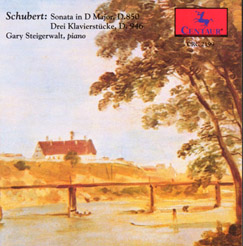 |
Gary Steigerwalt, pianist
Sonata recorded 1983 in Pratt Auditorium, Mount Holyoke College, South Hadley MA
Klavierstücke recorded August 1993 in Pratt Auditorium, Mount Holyoke College, South Hadley MA
|
|
Sonata in D Major, Op. 53/D.850 Drei Klavierstücke, D. 946 |
Boston Globe, December 22, 1984, review by Richard Buell"Steigerwalt proved to be an impressive pianist, a pianist of the kind that's gratifyingly hard to pin down. What you heard at the beginning of the three late Klavierstücke (D. 946) of Schubert was a beautifully flowing, blended, streamlined, legato kind of playing--but not, you realized soon enough, featurelessly, muzzily so. Steigerwalt wasn't vigorously "editorializing" about the text--that is, telling you that in Schubert's piano writing this line is the singer, and this line is the accompaniment.
It was all in the music, truly enough, but in a somewhat abstract manner that had a velvety pianistic charm and cogency rather than a singerly one. (To put it another way, you couldn't easily have added German words and Fischer-Dieskau inflections to the notes as they went along.)
The peroration of the third piece (the C Major Allegro) is one of those odd instances where Schubert doesn't sound so much like himself as somebody else--in this case, Antonin Dvorák in his furious, dirt-between-the-toes folk-dance vein--and here Steigerwalt got to be engagingly earthy and extrovert: a stylistic bullseye."
Boston Globe, April 11, 1997, review by Michael Manning
"Steigerwalt's approach is somewhat reserved, well-measured, and formidably logical. Yet it's somehow spontaneous, or at least fresh, and capable of imparting the best-known chestnuts in the literature as though they were new.
Schubert's piano music is perhaps the greatest vehicle for this kind of performer, for the technique has to disappear completely in the music, lest it coarsen it. In the Sonata in A Minor, D. 845, Steigerwalt found myriad ways to clarify voice leading without ever pounding out a submerged melody, or abandoning the overall texture to drool over something lovely, or resorting to excessive rhythmic license for expression. . . .
The lovely set of variations in the second movement unfolded with marvelous pace and contiguity, with true fortissimos only where Schubert asks for them, and a full range of dynamic shades between the loudest and the softest passages. The contrast of tone between the scherzo and the Trio--the two principal sections of the scherzo movement--was just right, and I especially appreciated the sudden contrasts between forte and piano in the finale, brought off cleanly and with clarity."